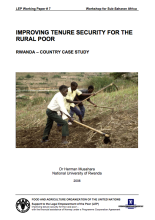Land Library
Welcome to the Land Portal Library. Explore our vast collection of open-access resources (over 74,000) including reports, journal articles, research papers, peer-reviewed publications, legal documents, videos and much more.
/ library resources
Showing items 1 through 9 of 16.Rwanda is developing at a remarkably rapid pace, and with that development has come a multitude of corresponding changes to the orientation and use of land throughout the country.
This Policy Brief summarizes the main findings and recommendations of qualitative and quantative research on implementation and outcomes of the 2007 Expropriation Law in Rwanda.
This case study has been produced in response to a request to the Evidence on Demand Helpdesk. The objective of the request was to provide a detailed case study on the approach taken to land tenure reform by the DFID-funded Land Tenure Regularisation Programme (LTRSP) in Rwanda.
A survey of some 3,500 households in and adjacent to land tenure regularization (LTR) pilot cells was undertaken some 2.5 years after completion of the LTR pilot.
Secure access to productive land is critical to poverty, acknowledging the complexity and
dynamics of evolving rural realities; (b) identify
the major implications of that relationship for
IFAD’s strategy and programme development
and implementation; (c) articulate guiding
This background briefing reports on a study of land access for returnees in Rwanda, and the impacts of land access policies in the post-conflict period.
This background briefing reports on a study of land access
for returnees in Rwanda, and the impacts of land access
policies in the post-conflict period. It also seeks to
understand better the roles international humanitarian
This paper examines land tenancy systems and tenant contracts in Rwanda, with
respect to socioeconomic contexts. Our research in southern and eastern Rwanda produced
data suggesting that land borrowing with fixed rents has been generally practiced, and that rent
Most of the world’s poor work in the “informal economy” – outside of recognized and enforceable rules.
Thus, even though most have assets of some kind, they have no way to document their possessions









